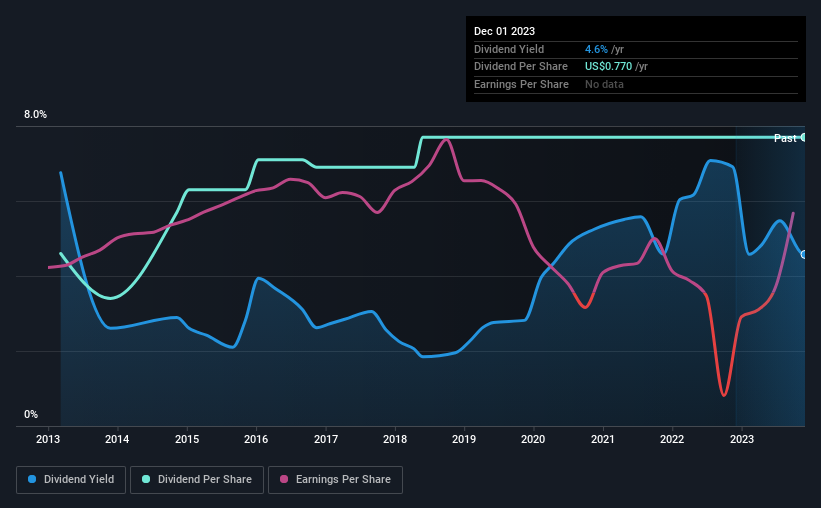- United States
- /
- Insurance
- /
- NYSE:UVE
Four Days Left Until Universal Insurance Holdings, Inc. (NYSE:UVE) Trades Ex-Dividend

Universal Insurance Holdings, Inc. (NYSE:UVE) is about to trade ex-dividend in the next four days. The ex-dividend date occurs one day before the record date which is the day on which shareholders need to be on the company's books in order to receive a dividend. The ex-dividend date is an important date to be aware of as any purchase of the stock made on or after this date might mean a late settlement that doesn't show on the record date. In other words, investors can purchase Universal Insurance Holdings' shares before the 7th of December in order to be eligible for the dividend, which will be paid on the 15th of December.
The company's upcoming dividend is US$0.29 a share, following on from the last 12 months, when the company distributed a total of US$0.77 per share to shareholders. Based on the last year's worth of payments, Universal Insurance Holdings has a trailing yield of 4.6% on the current stock price of $16.83. Dividends are a major contributor to investment returns for long term holders, but only if the dividend continues to be paid. So we need to check whether the dividend payments are covered, and if earnings are growing.
See our latest analysis for Universal Insurance Holdings
Dividends are usually paid out of company profits, so if a company pays out more than it earned then its dividend is usually at greater risk of being cut. Fortunately Universal Insurance Holdings's payout ratio is modest, at just 27% of profit.
When a company paid out less in dividends than it earned in profit, this generally suggests its dividend is affordable. The lower the % of its profit that it pays out, the greater the margin of safety for the dividend if the business enters a downturn.
Click here to see how much of its profit Universal Insurance Holdings paid out over the last 12 months.

Have Earnings And Dividends Been Growing?
Companies with falling earnings are riskier for dividend shareholders. If business enters a downturn and the dividend is cut, the company could see its value fall precipitously. So we're not too excited that Universal Insurance Holdings's earnings are down 4.3% a year over the past five years.
The main way most investors will assess a company's dividend prospects is by checking the historical rate of dividend growth. Universal Insurance Holdings has delivered an average of 5.3% per year annual increase in its dividend, based on the past 10 years of dividend payments.
To Sum It Up
Should investors buy Universal Insurance Holdings for the upcoming dividend? Earnings per share have shrunk noticeably in recent years, although we like that the company has a low payout ratio. This could suggest a cut to the dividend may not be a major risk in the near future. It doesn't appear an outstanding opportunity, but could be worth a closer look.
If you're not too concerned about Universal Insurance Holdings's ability to pay dividends, you should still be mindful of some of the other risks that this business faces. In terms of investment risks, we've identified 2 warning signs with Universal Insurance Holdings and understanding them should be part of your investment process.
Generally, we wouldn't recommend just buying the first dividend stock you see. Here's a curated list of interesting stocks that are strong dividend payers.
If you're looking to trade Universal Insurance Holdings, open an account with the lowest-cost platform trusted by professionals, Interactive Brokers.
With clients in over 200 countries and territories, and access to 160 markets, IBKR lets you trade stocks, options, futures, forex, bonds and funds from a single integrated account.
Enjoy no hidden fees, no account minimums, and FX conversion rates as low as 0.03%, far better than what most brokers offer.
Sponsored ContentNew: AI Stock Screener & Alerts
Our new AI Stock Screener scans the market every day to uncover opportunities.
• Dividend Powerhouses (3%+ Yield)
• Undervalued Small Caps with Insider Buying
• High growth Tech and AI Companies
Or build your own from over 50 metrics.
Have feedback on this article? Concerned about the content? Get in touch with us directly. Alternatively, email editorial-team (at) simplywallst.com.
This article by Simply Wall St is general in nature. We provide commentary based on historical data and analyst forecasts only using an unbiased methodology and our articles are not intended to be financial advice. It does not constitute a recommendation to buy or sell any stock, and does not take account of your objectives, or your financial situation. We aim to bring you long-term focused analysis driven by fundamental data. Note that our analysis may not factor in the latest price-sensitive company announcements or qualitative material. Simply Wall St has no position in any stocks mentioned.
About NYSE:UVE
Universal Insurance Holdings
Operates as an integrated insurance holding company in the United States.
Undervalued established dividend payer.
Similar Companies
Market Insights
Community Narratives




